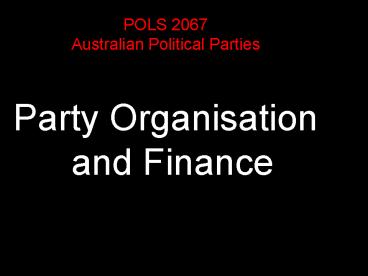POLS 2067 Australian Political Parties - PowerPoint PPT Presentation
1 / 12
Title:
POLS 2067 Australian Political Parties
Description:
Democratic deliberation within parties helps improve the quality, accountability ... It is irrelevant to the selection of the most saleable candidates and policies. ... – PowerPoint PPT presentation
Number of Views:62
Avg rating:3.0/5.0
Title: POLS 2067 Australian Political Parties
1
POLS 2067Australian Political Parties
- Party Organisation and Finance
2
Ratio of party members () to number of voters
3
Australian Labor Party
4
The Pyramid of Power- Barry Jones
Faction leaders National Conference delegates
2000 Total active ALP party membership 10
000 Total Labor Party national membership 50
000 Voters who are members of trade unions 2 000
000 Voters who are not members of trade unions 3
000 000 Total of potential Labor Party voters in
Australia 5 000 000
5
Arguments for internal party democracy
- Parties effectively decide who will be elected to
public office, so there is a legitimate
expectation that their own internal procedures
should be democratic. - This expectation reinforced when parties are
recipients of public funding in order to perform
their democratic roles. - Democratic organisation and culture within
parties helps create habits of democracy. - Democratic deliberation within parties helps
improve the quality, accountability and
inclusiveness of the policy processes.
6
Arguments against internal party democracy
- Politicians should be responsive to voters, not
to party activists who may have a different set
of policy preferences. - It gets in the way of effective inter-party
competition in the political market-place. - It is a brake on effective and efficient
decision-making - It is irrelevant to the selection of the most
saleable candidates and policies.
7
Difficulties of regulation
- What exactly are the general principles of fair
and democratic elections? - Who should determine them?
- To which aspects of party activity should they
apply?
8
Internal and External Regulation of Parties
- Electoral law covers how parties operate within
the electoral system - - public funding of elections
- - political broadcasting advertising
- - dislcosure of political donations
- Common law (mostly) applies to parties internal
workings - - no federal requirement for internal democracy
- - no requirement for participation of membership
9
Some comparisons
- Germany
- - internal organisation shall conform to
democratic principles - Portugal
- - must be governed by the principles of
transparency, democratic organisation and
management, and the participation of all of its
members
10
Justice Wooten, NSW Supreme Court, critical of
the judicial culture of avoiding matters
political
One can understand that judges, who feel so
keenly the importance of standing apart and being
seen to stand apart from partisan politics would
be reluctant to see the internal factional
struggles of political parties brought into the
courts. But the proper desire to avoid
identification of the judiciary with partisan
politics is not a justification for eschewing
responsibility for legal questions which happen
to arise in the political arena. - McKinnon v
Grogan (1974) 1 NSWLR 295
11
Rudd governments proposed changes on funding
- Set the campaign donation disclosure threshold at
1000, reversing the Howards government huge
increase in the threshold which took the
disclosure limit from 1,500 to over 10,000 - Ban donations from overseas or from
non-Australian companies, ensuring donations come
from a jurisdiction where our laws apply, and can
be enforced - Tie election funding to reported and verified
electoral expenditure directly incurred by a
candidate or party for an election, to stop any
candidate making a financial gain from the
electoral funding system - Remove the loophole whereby separate divisions of
a party are treated as separate entities, so
preventing large donations from being hidden by
paying portions across state and territory
branches of the same Party and - Increase public scrutiny of donations by reducing
disclosure timeframes from 12 months to six
months.
12
POLS 2067 Australian Political Parties
- The Politics of Coalition































